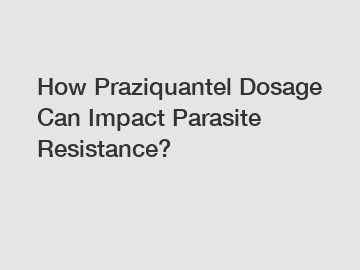How Praziquantel Dosage Can Impact Parasite Resistance?
Parasitic infections are a major global health issue, affecting millions of people every year. One of the most common treatments for parasitic infections is the drug praziquantel. Praziquantel is known for its efficacy in treating parasitic infections such as schistosomiasis, a disease caused by parasitic flatworms called schistosomes.
However, recent studies have shown that the dosage of praziquantel can have a significant impact on the development of parasite resistance. In this blog post, we will explore how praziquantel dosage can affect parasite resistance and what this means for the future of parasitic infection treatment.
Praziquantel is a broad-spectrum anthelmintic drug that is commonly used to treat a variety of parasitic infections. It works by causing paralysis and death of the parasites, allowing the body to eliminate them naturally. Praziquantel is highly effective at killing parasites, but like all drugs, it can lead to the development of resistance in the parasites over time.

Resistance to praziquantel occurs when parasites are exposed to the drug at suboptimal doses, allowing them to survive and reproduce despite the treatment. This can lead to a decrease in the effectiveness of praziquantel over time, making it harder to treat parasitic infections and potentially leading to treatment failure.
One of the key factors influencing the development of parasite resistance is the dosage of praziquantel used in treatment. Studies have shown that using lower doses of praziquantel can increase the risk of resistance development, as the parasites are not adequately exposed to the drug to be killed off completely. This can lead to the survival of resistant parasites that can then spread and multiply, making future treatments less effective.
On the other hand, using higher doses of praziquantel can help to reduce the risk of resistance development by ensuring that all parasites are exposed to a lethal dose of the drug. This can help to kill off the parasites more effectively and reduce the chances of resistant strains emerging.
However, using higher doses of praziquantel is not without risks. High doses of the drug can lead to serious side effects in some patients, including nausea, headache, and dizziness. In severe cases, high doses of praziquantel can even lead to liver toxicity and other serious complications.
So, what is the best way to balance the need for effective treatment with the risk of resistance development and side effects? The key lies in finding the optimal dosage of praziquantel for each individual patient. This can be done through careful monitoring of the patient's response to treatment and adjusting the dosage as needed to ensure that it is both effective and safe.
In some cases, combination therapy with other drugs may be used to reduce the risk of resistance development. By using multiple drugs with different mechanisms of action, it is possible to target the parasites more effectively and reduce the chances of resistance emerging.
Overall, it is clear that praziquantel dosage plays a crucial role in the development of parasite resistance. By using the right dosage of the drug and monitoring patients closely, it is possible to achieve effective treatment outcomes while minimizing the risk of resistance development and side effects. This approach will be essential in the fight against parasitic infections and ensuring that praziquantel remains an effective treatment option for years to come.
Want more information on Praziquantel Cp Standard, Praziquantel Powder Bulk, Custom Ivermectin Api? Feel free to contact us.

Comments
0